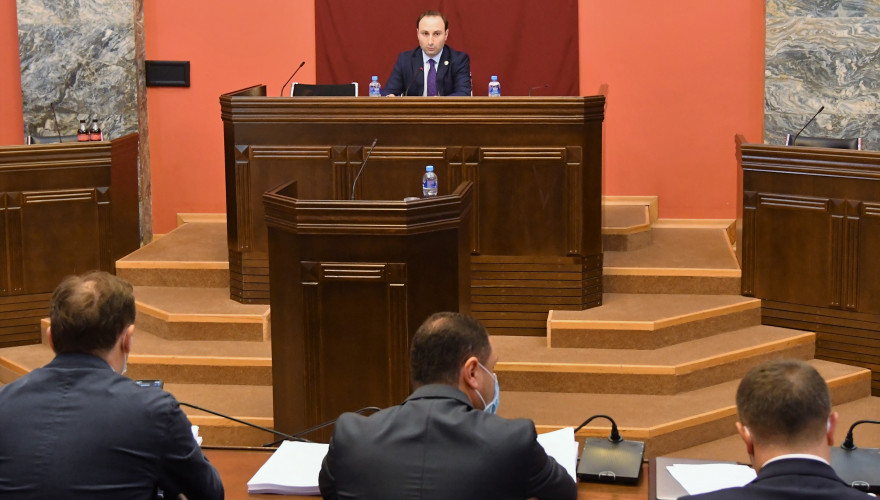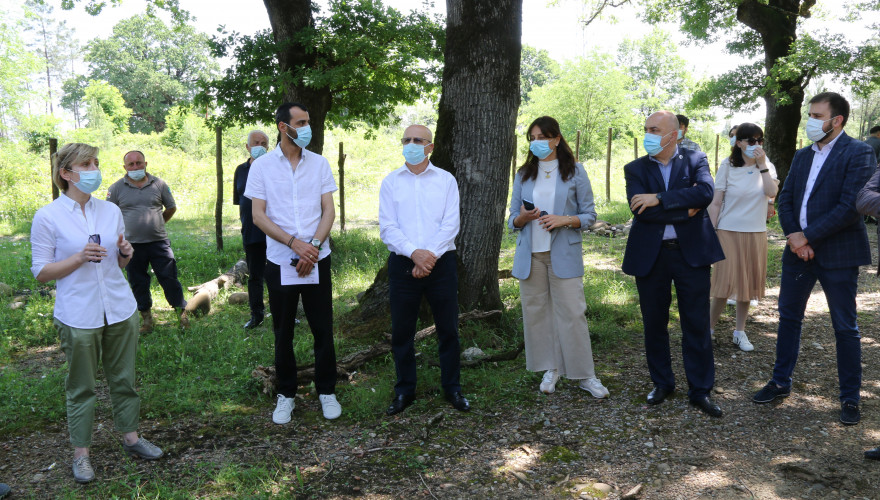Sitting of Legal Issues Committee

The investigator to be authorized to involve the coordinator of witnesses and the victim in the criminal case together with the prosecutor
The Legal Issues Committee considered with I reading the draft Criminal Procedure Code submitted by the Government through a legislative initiative, along with the accompanying documents.
The change defines the investigator, together with the prosecutor, to be authorized to involve the coordinator of witnesses and the victim in the criminal case.
According to the amendments, the issue of expediency of involving the coordinator of witnesses and the victim in the criminal case will be considered by the prosecutor at any stage of the proceedings, and by the investigator before the case is brought to court.
As the rapporteur, Deputy Minister of Internal Affairs, Alexander Darakhvelidze elucidated, the Witnesses and the Victim Coordinator Service has been operating in the Prosecutor's Office of Georgia since 2011, whereas the same service has been operating in the Ministry of Internal Affairs since 2019 to currently cover all regions of Georgia.
Pursuant to the current version of the Criminal Procedure Code, the decision to involve the coordinator in the criminal process is made by the prosecutor, in conditions where the service also exists in the system of the Ministry of Internal Affairs, for the purpose of operational response, it is important that the investigator be empowered to make a similar decision at the investigation stage.
As the Chair of the Committee, Anri Okhanashvili noted, the proposed changes will further contribute to the protection of the rights of victims - "This institution is quite successful in the legal process and we think that this innovation will help further protect and increase the rights of victims”.
The Committee approved the document to the Plenary.
Entrepreneurial relations will be regulated by a new legislative act
The Committee deliberated with I reading the Bill on Entrepreneurs.
The document: Separates the types of capital; Establishes general rules related to the bodies of all forms of entrepreneurial society - the meeting of partners, the supervisory board, the governing bodies; Regulates the issues of reorganization of the entrepreneurial society and transfer of the registration of an entrepreneur registered in a foreign country to Georgia; Regulates the process of termination of the existence of an individual entrepreneur or entrepreneurial society and distinguishes three stages of termination of existence; Regulates issues related to the statute of limitations and determines the subjects that have the right to appeal the decisions of the partners' meeting, the supervisory board, and the director, etc.
According to the rapporteur, Mikheil Sarjveladze, Chairman of the Human Rights and Civil Integration Committee, the draft law has two main directions – "First, it is the introduction of clearer, more predictable regulations, and the other, the introduction of EU standards, which are requirements of the EU-Georgia Association Agreement and Association Agenda”.
A number of norms proposed by the bill will, on the one hand, strengthen the principle of statutory autonomy, and, on the other hand, will have a regulatory function in the process of exercising such autonomy.
With such an approach to the law, the parties will be able to better regulate corporate relations, and there will be an appropriate normative basis for cases of disorder in the statute of a separate issue, in order to avoid the legal vacuum that currently hinders, on the one hand, the parties and the court properly discuss and resolve issues. At the same time, the quality of protection of the rights of minority partners and third parties will be improved and corporate transparency will be increased.
The norms of the bill set the criteria according to which the specific norm of the draft should be determined whether it is dispositional or imperative.
The Committee approved the document to the Plenary.
The scope of enforcement will be regulated by a single, systematic legal document based on the principles of fairness, proportionality and human rights.
The Committee deliberated with I reading the draft Enforcement Code, which regulates the process of enforcement of documents, determines the arrangement and activities of the Chamber of Executives, as well as the provision of services by the National Bureau of Enforcement.
The institutes of "Executive of the National Bureau of Enforcement" and "Private Bailiff" are abolished and an entirely new system of enforcement is formed.
According to Mikheil Sarjveladze, the new model is entirely focused on the introduction of a private enforcement system - "This implies a full introduction of a Private Bailiff. Accordingly, the authority will be delegated to them. It will, of course, be a regulated profession. In this case, the main controlling body will be the National Bureau of Enforcement, which will retain the status, but it will be a qualitatively different institution in its functions. Its main function will be, on the one hand, to control the activities of bailiffs and, on the other hand, to provide the enforcement process with services that, in this case, may exist in a generalized form under one institution and therefore be equally accessible to all private bailiffs”.
One of the components of the new system is the Chamber of Executives, which includes all executives.
The rapporteur also noted that in the transition period, the electronic system of automatic distribution of cases will be provided for private executives on a random basis.
According to him, about a year after the enactment of the new Code, the bailiff will be authorized to carry out enforcement activities without considering the principle of the territory of the creditor, in addition to the cases received through the electronic system of automatic distribution of cases, on the basis of the creditor's application and the contract concluded with him.
By adopting the Code, the enforcement legislation of Georgia will be harmonized as much as possible with the legislation of the EU countries, which, in turn, will contribute to the protection of human rights, including property rights, and the improvement of the investment environment in general.
The Committee approved the document to the Plenary.
Legal relations related to windbreak rehabilitation, cultivation, maintenance, and protection will be defined by a new legal framework
The Committee deliberated the Bill on Windbreak/Shelterbelts with I reading.
The Bill envisages: interpretation of the terms; granting the status of the windbreak belt and registration of the windbreak belts; restoration and management of the windbreak belts; determination of the authorized persons and entities etc.
As the reporter, Chair of the Agrarian Issues Committee, Nino Tsilosani stated, the initiation of the Bill is part of the agrarian policy as the windbreak belts play the important role in agricultural productivity, especially in the crumble and the annual cultures - " The initiative is in direct connection with environmental protection as the windbreak belts protect the soil from the wind erosion”.
The Bill assigns the Environmental Ministry to, as of March 1, 2022, ensure the development and approval of the inventory plan for the existing windbreaks. The inventory checking shall be accomplished as of March 1, 2025.
The Committee, taking into account the comments made at the meeting, approved the document to the Plenary.





